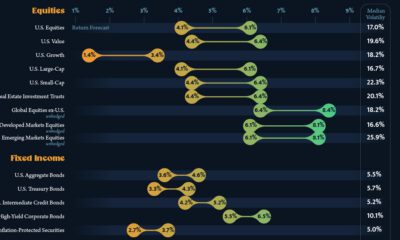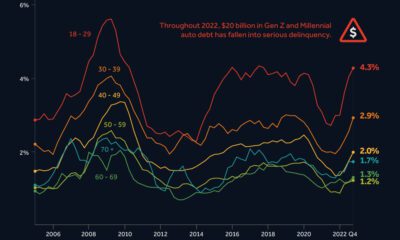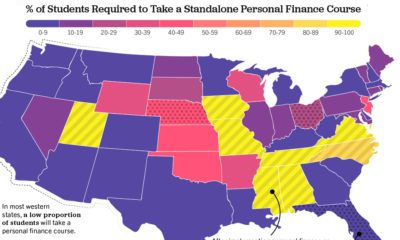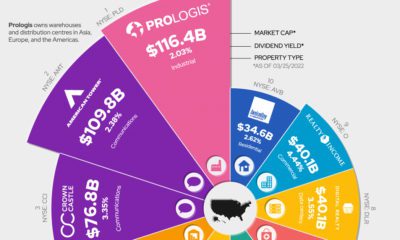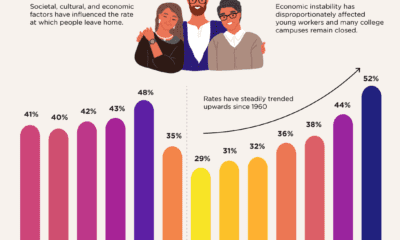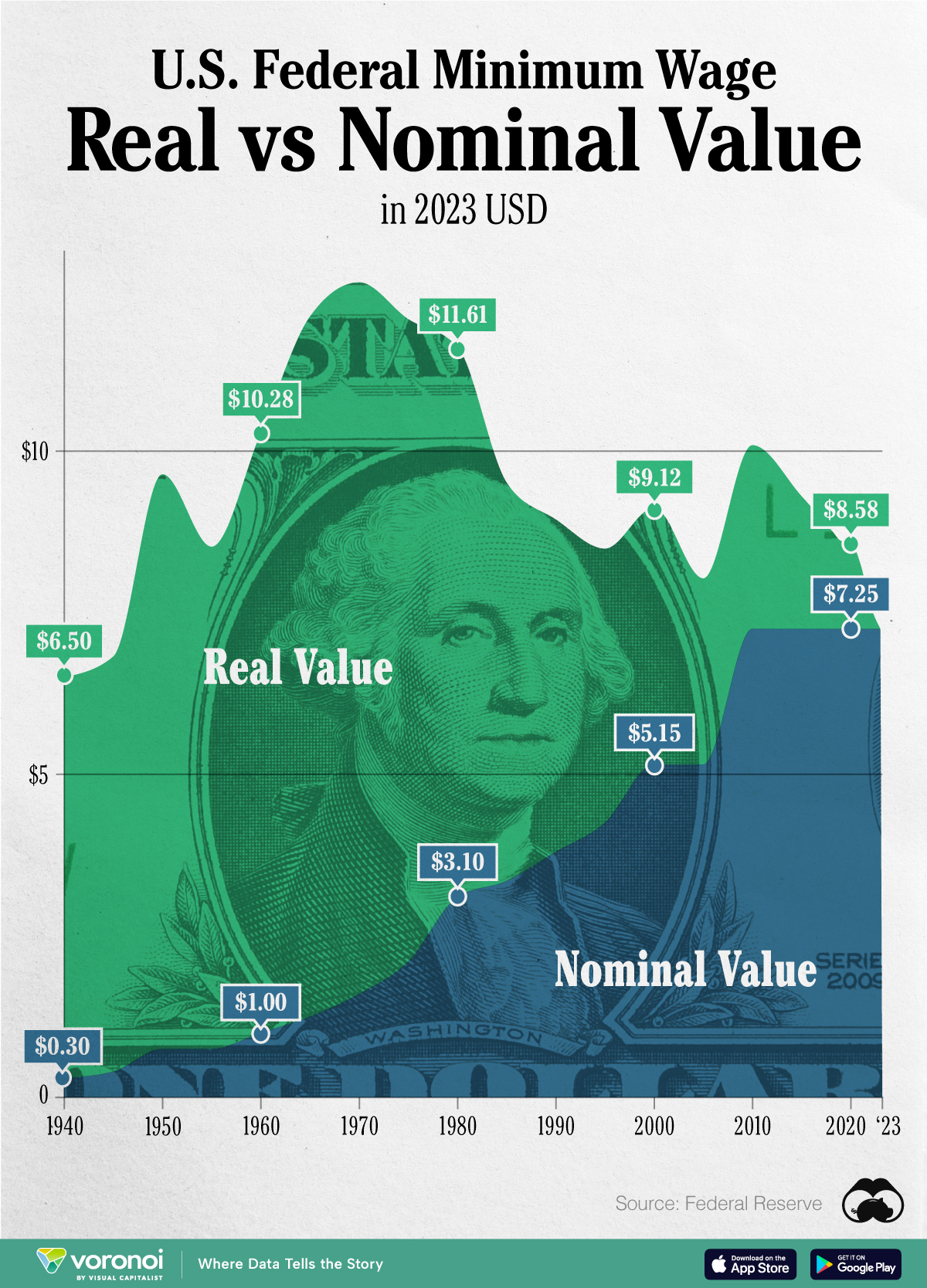Personal Finance
How to Find a Financial Advisor You Can Trust
.container {
max-width: 1070px;
}
.button {
display: inline-block;
height: 45px;
color: #ffffff;
text-align: center;
font-family: helvetica;
letter-spacing: .01rem;
text-decoration: none;
white-space: nowrap;
border-radius: 0px;
line-height: 45px;
border: 1px;
font-size: em(13);
cursor: pointer;
box-sizing: border-box;
background: #3E4347;
transition-duration: 0.4s;
margin-bottom: 1px;
width: 16.6666%;
}
.button-group {
position: left;
width: 100%;
display: inline-block;
list-style: none;
padding: 0;
margin: 0;
/* IE hacks */
zoom: 1;
*display: inline;
}
.button-group li {
float: left;
padding: 0;
margin: 0;
}
.button-group .button {
display: inline-block;
box-sizing: border-box;
color: white;
}
.button-group > .button:not(:first-child):not(:last-child), .button-group li:not(:first-child):not(:last-child) .button {
border-radius: 0;
}
.button-group > .button:first-child, .button-group li:first-child .button {
margin-left: 0;
border-top-right-radius: 0;
border-bottom-right-radius: 0;
}
.button-group > .button:last-child, .button-group li:last-child > .button {
border-top-left-radius: 0;
border-bottom-left-radius: 0;
border-bottom-right-radius: 0;
}
.button:hover {
background-color: #8E8059;
}
.button.active {
background-color: #8E8059;
}
.button-group :not(:last-child) {
border-right: 1px solid white;
padding-right: 2px;
}
.button-group {
border-right: none;
margin-right: none;
}
@media (max-width: 600px) {
.button {
font-size: 13px;}
}

How to Find a Financial Advisor You Can Trust
More and more people are using financial advisors to help them navigate the complex journey to financial freedom.
But although more Americans are seeking advice on matters of personal finance, they are also less sure that the advice they are getting is trustworthy.
Unfortunately, a growing amount of Americans see advisors as serving their companies’ best interests rather than their own best interests. According to a survey by The National Association of Retirement Plan Participants (NARPP), 60% of Americans now feel this way compared to just 25% of respondents in 2010.
Who Can Be Trusted?
Today’s infographic is from Tony Robbins, and it covers key points from his #1 Best Selling book Unshakeable: Your Financial Freedom Playbook, which is now available on paperback.
The book dissects the investment advisor landscape to show the value of a relationship with an advisor, the legal distinctions between different advisor types, and how advisors are incentivized.
Ultimately, it helps give you the ammo you need to find an investment advisor that will provide you with better service than the rest.
The Value of the Right Advisor
The right financial advisor can help you make better decisions, address your cognitive biases, and use their expertise to save you massive amounts of money.
A recent Vanguard study helps quantify the value a good advisor can bring:
- Lowering expense ratios: 0.45%
- Rebalancing portfolio: 0.35%
- Asset allocation: 0.75%
- Withdrawing the right investments in retirement: 0.70%
- Behavioral coaching: 1.50%
Total: 3.75% of added value!
That’s more than 3x what a sophisticated advisor might charge, and doesn’t include the benefits of reducing taxes or other areas.
Advisors vs. Brokers
There are roughly 310,000 people in the U.S. who call themselves financial advisors – but they actually fall under two different legal frameworks.
About 90% of this group are brokers, while 10% are registered investment advisors. Confusingly, there is also a significant portion who are dual-registered as both brokers and registered advisors, as well.
What’s the difference?
The two have different legal obligations, as well as differing ways of receiving compensation from clients:
Investment Advisor (RIA)
- RIAs are registered with the SEC and with the state they are working in
- Like doctors or lawyers, investment advisors have a fiduciary duty and legal obligation to their clients
- In other words, they must serve your best interest at all times
- They also must disclose any conflicts of interest
- They don’t accept commission from third-parties for their products
How they get paid: They charge a % based on assets managed, or a flat fee for financial advice
Brokers
- Brokers are usually employed by banks, brokerage houses, or insurance companies
- The products they recommend have to pass a suitability standard, based on your personal circumstances
- However, they do not have to necessarily recommend the best product for you
How they get paid: They get commissions for selling certain products to you. They may also charge based on assets under management, as well.
Picking the Right Advisor
Remember, the right advisor can add 3.75% of added value to a portfolio, and that’s before taxes and other areas! With the stakes so high, how can Americans pick the right advisor for them?
Here are the 7 questions Tony Robbins would ask a potential advisor to work with:
1. Are you a Registered Investment Advisor?
If the answer is yes, he or she is required by law to be a fiduciary.
2. Are you (or your firm) affiliated with a Broker-Dealer?
If yes, he or she can act as a broker and receive commissions for guiding you into specific investments.
3. Does your firm offer proprietary mutual funds or separately managed accounts?
These products will likely compensate them with additional revenues, at your expense.
4. Do you or your firm receive any third-party compensation for recommending particular investments?
This is the ultimate question you want answered. You want products to be recommended because they are right for you, not because they give the best kickbacks.
5. What’s your philosophy when it comes to investing?
This will help you understand whether your advisor believes he/she can beat the market.
6. What financial planning services do you offer beyond investment strategy and portfolio management?
Financial planning is much bigger than just investing – it also involves planning for your child’s education, handling vested stock options, estate planning, and tax advice. You want someone that can help you in all stages of your life.
7. Where will my money be held?
Having your money held by a trusted third-party custodian will mean your money is in a secure environment.
Like most financial endeavors, picking an advisor is an area lined with potential pitfalls.
But choosing the right investment advisor can be a difference maker – it can even possibly even set you up with many years of extra retirement savings.
Personal Finance
Chart: The Declining Value of the U.S. Federal Minimum Wage
This graphic compares the nominal vs. inflation-adjusted value of the U.S. minimum wage, from 1940 to 2023.
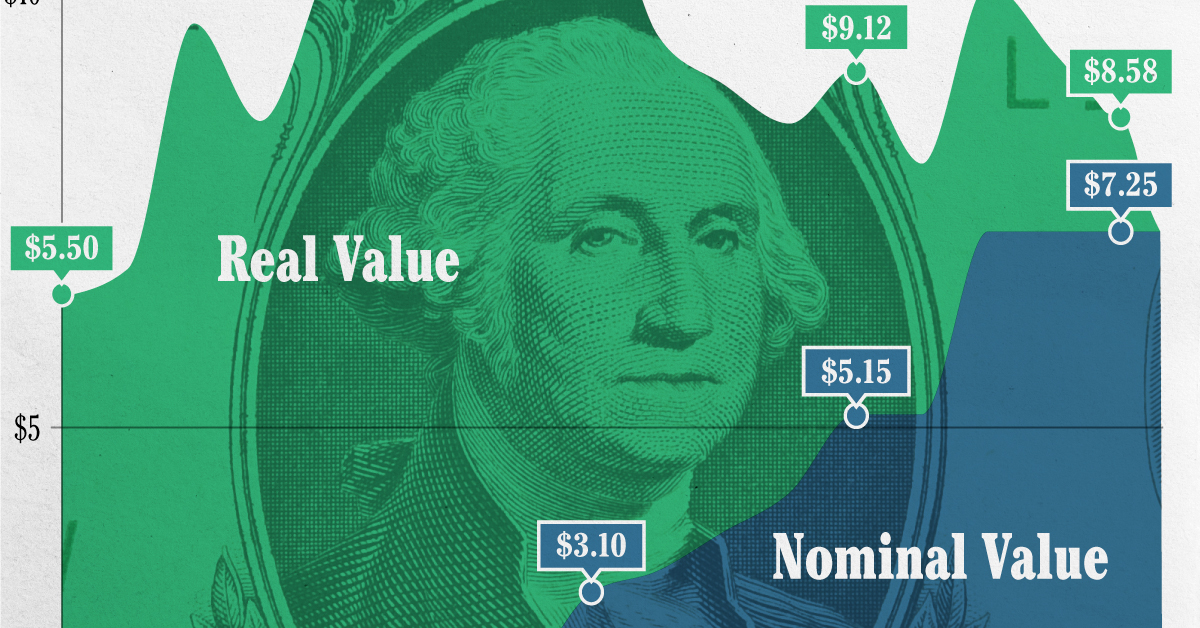
The Declining Value of the U.S. Federal Minimum Wage
This was originally posted on our Voronoi app. Download the app for free on iOS or Android and discover incredible data-driven charts from a variety of trusted sources.
This graphic illustrates the history of the U.S. federal minimum wage using data compiled by Statista, in both nominal and real (inflation-adjusted) terms. The federal minimum wage was raised to $7.25 per hour in July 2009, where it has remained ever since.
Nominal vs. Real Value
The data we used to create this graphic can be found in the table below.
| Year | Nominal value ($/hour) | Real value ($/hour) |
|---|---|---|
| 1940 | 0.3 | 6.5 |
| 1945 | 0.4 | 6.82 |
| 1950 | 0.75 | 9.64 |
| 1955 | 0.75 | 8.52 |
| 1960 | 1 | 10.28 |
| 1965 | 1.25 | 12.08 |
| 1970 | 1.6 | 12.61 |
| 1975 | 2.1 | 12.04 |
| 1980 | 3.1 | 11.61 |
| 1985 | 3.35 | 9.51 |
| 1990 | 3.8 | 8.94 |
| 1995 | 4.25 | 8.49 |
| 2000 | 5.15 | 9.12 |
| 2005 | 5.15 | 8.03 |
| 2010 | 7.25 | 10.09 |
| 2015 | 7.25 | 9.3 |
| 2018 | 7.25 | 8.78 |
| 2019 | 7.25 | 8.61 |
| 2020 | 7.25 | 8.58 |
| 2021 | 7.25 | 8.24 |
| 2022 | 7.25 | 7.61 |
| 2023 | 7.25 | 7.25 |
What our graphic shows is how inflation has eroded the real value of the U.S. minimum wage over time, despite nominal increases.
For instance, consider the year 1960, when the federal minimum wage was $1 per hour. After accounting for inflation, this would be worth around $10.28 today!
The two lines converge at 2023 because the nominal and real value are identical in present day terms.
Many States Have Their Own Minimum Wage
According to the National Conference of State Legislatures (NCSL), 30 states and Washington, D.C. have implemented a minimum wage that is higher than $7.25.
The following states have adopted the federal minimum: Georgia, Idaho, Indiana, Iowa, Kansas, Kentucky, New Hampshire, North Carolina, North Dakota, Oklahoma, Pennsylvania, Texas, Utah, Wisconsin, and Wyoming.
Meanwhile, the states of Alabama, Louisiana, Mississippi, South Carolina, and Tennessee have no wage minimums, but have to follow the federal minimum.
How Does the U.S. Minimum Wage Rank Globally?
If you found this topic interesting, check out Mapped: Minimum Wage Around the World to see which countries have the highest minimum wage in monthly terms, as of January 2023.
-
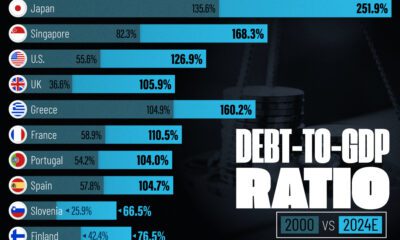
 Debt1 week ago
Debt1 week agoHow Debt-to-GDP Ratios Have Changed Since 2000
-

 Markets2 weeks ago
Markets2 weeks agoRanked: The World’s Top Flight Routes, by Revenue
-

 Countries2 weeks ago
Countries2 weeks agoPopulation Projections: The World’s 6 Largest Countries in 2075
-

 Markets2 weeks ago
Markets2 weeks agoThe Top 10 States by Real GDP Growth in 2023
-

 Demographics2 weeks ago
Demographics2 weeks agoThe Smallest Gender Wage Gaps in OECD Countries
-

 United States2 weeks ago
United States2 weeks agoWhere U.S. Inflation Hit the Hardest in March 2024
-

 Green2 weeks ago
Green2 weeks agoTop Countries By Forest Growth Since 2001
-

 United States2 weeks ago
United States2 weeks agoRanked: The Largest U.S. Corporations by Number of Employees


